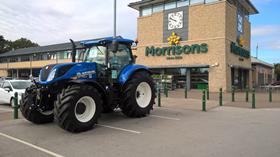
Morrisons has pledged that it will not sell farm-branded products with fictitious names after a survey found that 70 per cent of adults objected to it.
The retailer announced its commitment to coincide with Farm24, a social media campaign running today (10 August) that celebrates British farmers and real farming.
As well as participating online, the retailer has hosted in-store ‘meet the farmer’ events where farmers and food producers explained the process and authenticity behind homegrown food to shoppers.
Morrisons said that more than 70 per cent of the food it sells this week will be British, the highest share it reaches during the year, as British lamb, soft fruit, summer vegetables such as broccoli, courgettes, sweetcorn, and new potatoes reach peak season.
The retailer’s head of British livestock Joe Mannion said: “Real farmers have an important role to play in explaining to customers how important real British food is, and how customers can tell whether food is from the UK or not.'
In a survey of its shoppers, Morrisons found that 70 per cent of UK adults object to the use of fake farm brands and only want real place names or farm names to be used on packaging and branding.
“Supermarket customers are sometimes presented with misleading images of farmers on their food and we believe that by meeting our real farmers, customers will see and value that we know where our food comes from,” added Mannion.
The NFU has been outspoken in protest of fictitious farm ranges at other top four supermarkets, including Tesco and Asda. The farming union claims that such branding is misleading and implies that the produce is both British and originates from the stated farm, when this may not be true.
Morrisons has previously dropped a poultry range that was branded as ‘Helmsley’, in reference to the Yorkshire town, after the NFU pointed out it was misleading to stock imported meat under a British-sounding name.
NFU deputy president Minette Batter said: “In our view it is important that product names and descriptions on packaging are clear, accurate and do not mislead consumers.
“We would always encourage shoppers to look out for the Red Tractor logo to ensure the food is produced to the highest welfare standards, and can be traced back to a British farm.”



